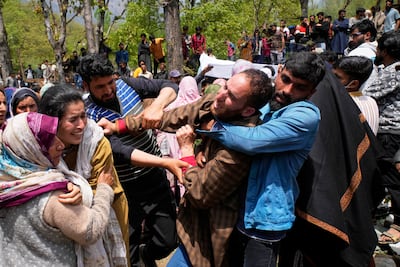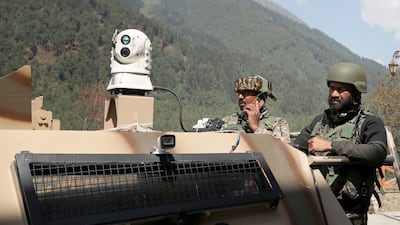India sent military helicopters and special forces scoured densely forested mountains in Indian-administered Kashmir on Wednesday for gunmen who killed at least 26 people at a tourist spot.
The attack took place at Baisaran in Pahalgam, a Himalayan summer resort, on Tuesday afternoon, when the attackers emerged from the forest and raked the crowds of visitors with automatic gunfire.
There were about 200 tourists and locals, including women and children, at the spot, which is surrounded by pine trees and a glacial lake and is accessible only on foot or by pony.
Those killed were all men, and included a citizen of Nepal, a former Indian government official, a former naval officer, and an air force employee. Another 17 people were injured.
The attack was the deadliest in more than two decades in India’s restive Kashmir region, where militants have waged an insurgency seeking independence or accession to Pakistan.
Prime Minister Narendra Modi cut short his trip to Saudi Arabia and returned to New Delhi on Wednesday, where he held a meeting with National Security Adviser Ajit Doval and External Affairs Minister Subrahmanyam Jaishankar.
Home Minister Amit Shah, who supervises India’s internal security, visited Baisaran and laid wreaths on the bodies of the victims. He also met with the families of the dead and survivors and assured them that the “culprits of the dastardly attacks will not be spared”.
A group calling itself the Resistance Front claimed the attack, saying it was targeted at people from outside the region who "arrive posing as tourists, obtain domiciles, and then begin to act as if they own the land", local media reported.
Indian authorities released sketches of the attackers and gave the names of three as Asif Fuji, Suleman Shah and Abu Talha.
Indian authorities have hinted at Pakistan’s role in the attack, which coincided with a fierce gun battle along the Line of Control – the de facto border dividing the Kashmir region between India and Pakistan.
The Indian army said it shot two alleged infiltrators trying to enter the Kashmir valley in Uri region, north of the capital Srinagar.
Tuesday’s attack was the largest since March 2000, when militants shot dead 35 people from the Sikh community in the Chittisinghpura area of the valley. The attack coincided with the visit of then-US president Bill Clinton to New Delhi.
Tuesday's attack came during a visit by US Vice President JD Vance, whose wife is of Indian origin.
"Usha and I extend our condolences to the victims of the devastating terrorist attack in Pahalgam, India. Over the past few days, we have been overcome with the beauty of this country and its people. Our thoughts and prayers are with them as they mourn this horrific attack," Mr Vance wrote on X.
Control of the Kashmir region is divided between India and Pakistan but both claim it in its entirety since British occupiers left the subcontinent in 1947.
Kashmir valley has been in the grip of a decades-long armed rebellion against New Delhi’s rule that has left tens of thousands of people dead. The region has an estimated 500,000 soldiers permanently stationed in the territory, with overall armed militancy witnessing a sharp decline in recent years.
Mr Modi’s government revoked the region's semi-autonomous status in 2019, months after 40 paramilitary troops were killed in Kashmir’s Pulwama district.
The government claimed that “peace and normality” had returned to the valley and promoted tourism to the region, known for its glacial lakes, snow-capped mountains, alpine meadows and pine forests. Tourism had dipped at the peak of insurgency in the 1990s, but has surged in recent years.
“This is a crime against humanity, it is not about tourism or the economy. Our head hangs in shame,” Asif Burza, owner of the Ahad Hotel in Pahalgam, told The National.
“We are trying to make the tourists comfortable and trying to comfort them,” he said.
Pahalgam, located east of Srinagar, is a heavily fortified region used as a base camp for the Amarnath pilgrimage to a cave shrine dedicated to the Hindu god Shiva, which draws nearly half a million people every summer. This year’s pilgrimage is expected to begin in July.
Tuesday’s attack has shaken the nation and sparked fears among residents of Kashmir that it will disrupt tourism, a major contributor to the local economy.
57%20Seconds
%3Cp%3E%3Cstrong%3EDirector%3A%3C%2Fstrong%3E%20Rusty%20Cundieff%0D%3Cbr%3E%3Cstrong%3EStars%3A%20%3C%2Fstrong%3EJosh%20Hutcherson%2C%20Morgan%20Freeman%2C%20Greg%20Germann%2C%20Lovie%20Simone%0D%3Cbr%3E%3Cstrong%3ERating%3A%20%3C%2Fstrong%3E2%2F5%0D%3Cbr%3E%0D%3Cbr%3E%3C%2Fp%3E%0A
Various Artists
Habibi Funk: An Eclectic Selection Of Music From The Arab World (Habibi Funk)
Dark Souls: Remastered
Developer: From Software (remaster by QLOC)
Publisher: Namco Bandai
Price: Dh199
THE%20SPECS
%3Cp%3EBattery%3A%2060kW%20lithium-ion%20phosphate%3Cbr%3EPower%3A%20Up%20to%20201bhp%3Cbr%3E0%20to%20100kph%3A%207.3%20seconds%3Cbr%3ERange%3A%20418km%3Cbr%3EPrice%3A%20From%20Dh149%2C900%3Cbr%3EAvailable%3A%20Now%3C%2Fp%3E%0A
The specs: 2018 Opel Mokka X
Price, as tested: Dh84,000
Engine: 1.4L, four-cylinder turbo
Transmission: Six-speed auto
Power: 142hp at 4,900rpm
Torque: 200Nm at 1,850rpm
Fuel economy, combined: 6.5L / 100km
FFP EXPLAINED
What is Financial Fair Play?
Introduced in 2011 by Uefa, European football’s governing body, it demands that clubs live within their means. Chiefly, spend within their income and not make substantial losses.
What the rules dictate?
The second phase of its implementation limits losses to €30 million (Dh136m) over three seasons. Extra expenditure is permitted for investment in sustainable areas (youth academies, stadium development, etc). Money provided by owners is not viewed as income. Revenue from “related parties” to those owners is assessed by Uefa's “financial control body” to be sure it is a fair value, or in line with market prices.
What are the penalties?
There are a number of punishments, including fines, a loss of prize money or having to reduce squad size for European competition – as happened to PSG in 2014. There is even the threat of a competition ban, which could in theory lead to PSG’s suspension from the Uefa Champions League.
The specs
Engine: 1.5-litre turbo
Power: 181hp
Torque: 230Nm
Transmission: 6-speed automatic
Starting price: Dh79,000
On sale: Now
GAC GS8 Specs
Engine: 2.0-litre 4cyl turbo
Power: 248hp at 5,200rpm
Torque: 400Nm at 1,750-4,000rpm
Transmission: 8-speed auto
Fuel consumption: 9.1L/100km
On sale: Now
Price: From Dh149,900
Godzilla%20x%20Kong%3A%20The%20New%20Empire
%3Cp%3E%3Cstrong%3EDirector%3A%20%3C%2Fstrong%3EAdam%20Wingard%3C%2Fp%3E%0A%3Cp%3E%3Cstrong%3EStarring%3A%20%3C%2Fstrong%3EBrian%20Tyree%20Henry%2C%20Rebecca%20Hall%2C%20Dan%20Stevens%3C%2Fp%3E%0A%3Cp%3E%3Cstrong%3ERating%3A%3C%2Fstrong%3E%204%2F5%3C%2Fp%3E%0A
%E2%80%98FSO%20Safer%E2%80%99%20-%20a%20ticking%20bomb
%3Cp%3EThe%20%3Cem%3ESafer%3C%2Fem%3E%20has%20been%20moored%20off%20the%20Yemeni%20coast%20of%20Ras%20Issa%20since%201988.%3Cbr%3EThe%20Houthis%20have%20been%20blockading%20UN%20efforts%20to%20inspect%20and%20maintain%20the%20vessel%20since%202015%2C%20when%20the%20war%20between%20the%20group%20and%20the%20Yemen%20government%2C%20backed%20by%20the%20Saudi-led%20coalition%20began.%3Cbr%3ESince%20then%2C%20a%20handful%20of%20people%20acting%20as%20a%20%3Ca%20href%3D%22https%3A%2F%2Fwww.google.ae%2Furl%3Fsa%3Dt%26rct%3Dj%26q%3D%26esrc%3Ds%26source%3Dweb%26cd%3D%26ved%3D2ahUKEwiw2OfUuKr4AhVBuKQKHTTzB7cQFnoECB4QAQ%26url%3Dhttps%253A%252F%252Fwww.thenationalnews.com%252Fworld%252Fmena%252Fyemen-s-floating-bomb-tanker-millions-kept-safe-by-skeleton-crew-1.1104713%26usg%3DAOvVaw0t9FPiRsx7zK7aEYgc65Ad%22%20target%3D%22_self%22%3Eskeleton%20crew%3C%2Fa%3E%2C%20have%20performed%20rudimentary%20maintenance%20work%20to%20keep%20the%20%3Cem%3ESafer%3C%2Fem%3E%20intact.%3Cbr%3EThe%20%3Cem%3ESafer%3C%2Fem%3E%20is%20connected%20to%20a%20pipeline%20from%20the%20oil-rich%20city%20of%20Marib%2C%20and%20was%20once%20a%20hub%20for%20the%20storage%20and%20export%20of%20crude%20oil.%26nbsp%3B%3C%2Fp%3E%0A%3Cp%3EThe%20%3Cem%3ESafer%3C%2Fem%3E%E2%80%99s%20environmental%20and%20humanitarian%20impact%20may%20extend%20well%20beyond%20Yemen%2C%20experts%20believe%2C%20into%20the%20surrounding%20waters%20of%20Saudi%20Arabia%2C%20Djibouti%20and%20Eritrea%2C%20impacting%20marine-life%20and%20vital%20infrastructure%20like%20desalination%20plans%20and%20fishing%20ports.%C2%A0%3C%2Fp%3E%0A
Unresolved crisis
Russia and Ukraine have been locked in a bitter conflict since 2014, when Ukraine’s Kremlin-friendly president was ousted, Moscow annexed Crimea and then backed a separatist insurgency in the east.
Fighting between the Russia-backed rebels and Ukrainian forces has killed more than 14,000 people. In 2015, France and Germany helped broker a peace deal, known as the Minsk agreements, that ended large-scale hostilities but failed to bring a political settlement of the conflict.
The Kremlin has repeatedly accused Kiev of sabotaging the deal, and Ukrainian officials in recent weeks said that implementing it in full would hurt Ukraine.
More from Rashmee Roshan Lall
Timeline
1947
Ferrari’s road-car company is formed and its first badged car, the 125 S, rolls off the assembly line
1962
250 GTO is unveiled
1969
Fiat becomes a Ferrari shareholder, acquiring 50 per cent of the company
1972
The Fiorano circuit, Ferrari’s racetrack for development and testing, opens
1976
First automatic Ferrari, the 400 Automatic, is made
1987
F40 launched
1988
Enzo Ferrari dies; Fiat expands its stake in the company to 90 per cent
2002
The Enzo model is announced
2010
Ferrari World opens in Abu Dhabi
2011
First four-wheel drive Ferrari, the FF, is unveiled
2013
LaFerrari, the first Ferrari hybrid, arrives
2014
Fiat Chrysler announces the split of Ferrari from the parent company
2015
Ferrari launches on Wall Street
2017
812 Superfast unveiled; Ferrari celebrates its 70th anniversary









